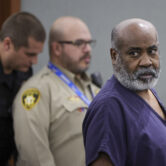MINNEAPOLIS (CN) — The trial of former Minneapolis police officer Derek Chauvin for the death of George Floyd will go on as scheduled in Minneapolis, and evidence related to an earlier arrest Chauvin’s attorney says speaks to a pattern of behavior for Floyd will be tightly restricted.
Hennepin County Judge Peter Cahill ruled on several motions before proceeding to jury selection in Chauvin’s second- and third-degree murder and second-degree manslaughter trial on Friday morning, putting a stop to arguments regarding the potentially prejudicial impact of a series of press junkets by Minneapolis officials.
The city recently announced a $27 million settlement with the Floyd family, the largest wrongful-death settlement in American history. The record-breaking payout, which is still being finalized, led Cahill to re-interview several jurors and dismiss two after Chauvin’s attorney Eric Nelson of Halberg Criminal Defense argued that news of the settlement could prejudice the mostly seated jury.
On Thursday, Mayor Jacob Frey and members of the city attorney’s office answered reporter questions about the settlement at a weekly media briefing, leading Nelson to bring back requests he made earlier in the case for a continuance or change of venue.
Cahill denied both of those motions early Friday morning, saying that while he was surprised to see the impact of the settlement on jurors, he still didn’t think time or distance would improve the fairness of the trial.
“Unfortunately, I think the pretrial publicity in this case will continue no matter how long we continue it,” he said. “And as far as change of venue, I do not think that would give the defendant any kind of a fair trial beyond what we are doing here today. I don’t think there is any place in the state of Minnesota that has not been subjected to extreme amounts of publicity on this case.”
Both sides in the case have argued for a continuance at various points in the trial for different reasons. Prosecutors pushed for a later trial shortly after the first Covid-19 vaccines were introduced, arguing that a rise in vaccinations would make the proceedings safer. Cahill denied that motion in Chauvin’s case but split off the trial of fellow officers Thomas Lane, J. Alexander Kueng and Tou Thao, finding that having four defendants and their legal teams in the room would make it too crowded for effective social distancing. The trio’s trial is still joined and is now set for August.
Minnesota Attorney General Keith Ellison, whose office is leading the prosecution, nevertheless celebrated the decision on Friday morning in a statement.
“The court has taken careful, considered steps to mitigate the effects of pretrial publicity that make a continuance and change of venue unnecessary. A week ahead of schedule, both sides have now agreed on 12 jurors, more than half of whom were selected since early last Friday afternoon and all of whom have been carefully screened for impartiality in the face of inevitable pretrial publicity not only in Hennepin County, but in every part of Minnesota,” he said. “As we have said throughout, the state has been and is ready to proceed to trial on schedule. We look forward to presenting our case against Mr. Chauvin … to a fair and impartial jury in Hennepin County."
Also at issue Friday was a May 6, 2019, interaction Floyd had with police which ended in severe medical distress. Nelson and attorneys for the three other former officers involved in Floyd’s May 25, 2020, arrest and death have pointed to the earlier incident, in which police say Floyd ate drugs when they confronted him at gunpoint, as showing a modus operandi for Floyd in dealing with police. Floyd was ultimately examined by paramedics, who warned him that his blood pressure was dangerously high.









